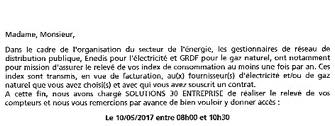
Among people of other nationalities, the French are often perceived as being overly formal, the kind of stuffy prigs who speak in florid prose and keep their pinkies up even under anesthesia. Today I would like to set the record straight: this stereotype is biased, facile, hackneyed, stale and trite. And true.
Ornate, overwrought rhetoric is, in fact, a time-honored French tradition that extends from Louis XIV – famous for his oft-abridged quote, “I am the[atrically inclined, so I always try to think of the fanciest way to express anything I want to] state” – all the way to my electric bill.
Last week, I received a letter from what in the United States would be called the light and power company and in France ought to be called the heavy and flowery verbiage company. The purpose of this communication was to inform me that someone is coming to read my meter.
The contrast between how this commonplace event is handled in the two countries could hardly be greater. Things may be different now, but when I lived in the States, a meter reader would come around the neighborhood once a month with no advance warning. The meters were accessible from the outside so he didn’t even have to knock on the door.
The guy would shout “Meter man!” as a warning, so the nudists could close the curtains and the gun owners wouldn’t shoot him. Or would at least aim over his head. In any case, those two words were all the communication anyone ever had with anyone else on the topic.
But in France I get a letter first. And not just any letter, but a 350-word epistle couched in the most formal terms possible, which in France is saying something. Here’s a more-or-less literal translation of the first paragraph:
“Within the framework of the organization of the energy sector, the managing bodies responsible for the public distribution networks, [name of company] for electricity and [name of company] for natural gas, are entrusted, in particular, with the mission of guaranteeing the monitoring of your consumption indices at least once per calendar year. These indices are then transmitted, in view of invoicing, to the electrical and/or natural gas supplier or suppliers that you have selected and with which you have concluded a contract. To this end, we have entrusted [name of third company] to proceed with the inspection of your meters. We thank you in advance for having the kindness to afford access to your domicile on the date indicated below.”
Note to readers who think I’m exaggerating: I don’t blame you. But, in violation of my usual policies and principles, I’m not. Much.
If you can read French (and lousy, low-res scans), here’s the proof:

The letter then goes on for another two-thirds of a page, specifying when the meter reader will come to my building, describing the four possible courses of action available to me if I’m not at home that day, and ending with the traditional French equivalent of “Sincerely yours,” which is (and here I’m not exaggerating at all): “We beseech you, Madam or Sir, to acknowledge the expression of our distinguished salutations.”
All that just to say, in effect, “Hey! Meter guy’s comin’! Here’s when.”
Note that not only does the letter have a thick, high-gloss veneer of formality, but most of it is useless explanation – “Fransplaining,” as I called it on a previous occasion. After all, who needs so much background information on why a utility company needs to read meters? (“What’s this box thing on the wall? You mean I have to pay for electricity? No way!”)
This made me wonder: what if everyone were, and always had been, as fond of over-explanation and puffed-up parlance as the French? Many of the most famous episodes in history would read quite differently…
490 BCE. The courier Philippides has just run 25 miles from the battlefield of Marathon to Athens to announce the Greeks’ unexpected victory over the Persians. Falling to the ground, he gasps out:
“Within the framework of the conveyance of military information by the speediest, most efficient means currently available, without, insofar as possible, being shot, I have been entrusted, in particular, with the mission of running without pause from Marathon to apprise the municipal authorities of Athens, whom I would like to thank in advance for having the kindness to pay close attention to this official dispatch, that our forces have… glearrrrgh!”
(Philippides died before completing his message, and the Athenians didn’t find out that they had won until four days later, when their troops returned, hauling wagonloads of looted rugs covered with long cat hairs.)
May 24, 1844. Samuel F. B. Morse, in Washington D.C. to demonstrate his new invention, sends the world’s first telegraph message:
“What, as the managing entity responsible for the entire universe, hath God, in keeping with His self-imposed mission of creating and subsequently monitoring the heavens and earth, wrought? In anticipation of your reply, I feel that I should point out that this is a purely rhetorical question, and I beseech you to acknowledge the expression of my distinguished salutations, but not to launch into a long, windy metaphysical exegesis like some French armchair philosopher. It’s just a demo, okay?”
Mason City, Iowa, March 13, 1934. John Dillinger hands a note to the clerk behind the window at the First National Bank:
“Within the operational sphere of my efforts, as chief strategist of a criminal gang, to secure the largest amounts of money possible within the shortest feasible timeframe, I am charged, in particular, with the mission of holding up banks like yours several times per year. The cash funds entrusted to you by the depositors who have opened an account or accounts in your care are to be stolen and then transmitted, in view of both procuring life’s necessities and whooping it up, to my hideout in large leather satchels like the one you see in my left hand. To this end, I draw your attention to the firearm in my other hand and ask that you please have the kindness to afford me access to your vault, making it, as we say in the profession, ‘snappy’.”
Bastogne, Belgium, December 22, 1944, the Battle of the Bulge. The American commanding officer, General Anthony McAuliffe, hopelessly outnumbered, replies to the German commander’s entreaty for him to surrender:
“Nuts! Allow me to elucidate. In my capacity as the managing officer for the public distribution of Allied projectiles from various types of weapons in this zone, rifles for bullets and artillery for heavy shells, I am called upon to respond to your missive suggesting that I capitulate immediately and unconditionally. I have come to the conclusion that I can, in view of increasing your consumption indices of said projectiles, transmit my reaction in a single word, namely a mild slangy expletive indicating my rejection of your proposal, i.e., the aforementioned ‘nuts.’ Or, since we’re in Belgium, noix! Feel free to contact me for any further information that you might require.”
On a train to Gettysburg, Pennsylvania, November 18, 1863. Abraham Lincoln reads through the first draft of the speech he is to give the next day, and dictates a note to his secretary:
“Eighty-seven years ago… Hmm. Grant says that Lee’s hot-looking French cook has come over to our side and is going to be at the ceremony. I wonder how I could reword this to impress her?”
The next new C’est Ironique will appear on May 17.
FavoriteAn album of David Jaggard’s comic compositions is now available for streaming on Spotify and Apple Music, for purchase (whole or track by track) on iTunes and Amazon, and on every other music downloading service in the known universe, under the title “Totally Unrelated.”
Note to readers: David Jaggard’s e-book Quorum of One: Satire 1998-2011 is available from Amazon as well as iTunes, iBookstore, Nook, Reader Store, Kobo, Copia and many other distributors.
